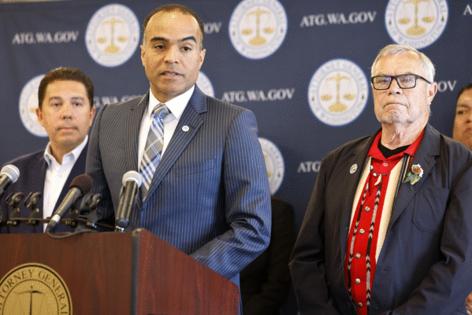Supreme Court shoots down challenge to Washington carbon market
Published in News & Features
The U.S. Supreme Court on Monday declined to hear a high-profile challenge to Washington's Climate Commitment Act, marking yet another victory for the state's keystone climate policy.
The lawsuit started with the private operator of a natural gas power plant in Grays Harbor County. The plant is required to buy pollution allowances to pay for the many tons of greenhouse gasses it emits into the atmosphere under the 2021 "Cap and Invest" law.
The plant’s owner, Chicago-based Invenergy, sued Laura Watson, then-head of Washington’s Department of Ecology, in late 2022, arguing that the state’s carbon market is unconstitutional. The lawsuit claimed that the state law discriminated against privately operated natural gas plants (public utilities receive allowances free) and unfairly treated it as an out-of-state business.
In late 2023, U.S. District Court Judge Benjamin Settle shot down both of Invenergy’s arguments and dismissed the case. The company appealed.
All the while, another major challenge to the Climate Commitment Act emerged with the Republican-backed ballot initiative designed to kill the policy. The referendum amounted to a statewide litmus test for the carbon market. Voters previously rejected similar efforts in 2016 and 2018.
But last November, voters overwhelmingly denied the initiative, with 62% supporting the carbon market. Weeks later, the U.S. Ninth Circuit Court of Appeals affirmed Judge Settle’s dismissal of Invenergy’s case.
Again the company appealed, this time to the U.S. Supreme Court. It filed a petition for what’s called a writ of certiorari in March, asking the country’s highest court to take up the case.
By that time Gov. Bob Ferguson had taken over the reins as the state’s chief executive and placed Casey Sixkiller at the head of Ecology. Both argued to keep the Climate Commitment Act in place.
The Supreme Court on Monday denied Invenergy’s petition outright. The justices did not publish any written justification for their decision.
For former state Sen. Reuven Carlyle, one of the chief architects of the Climate Commitment Act, the Supreme Court’s ruling comes as yet another affirmation that the policy is sound and fairly asks polluters across the board to pay for the emissions they produce.
There’s no small bit of irony in the company, one of the largest producers of renewable energy in the country, suing to overturn a major state-level climate bill, Carlyle noted.
Representatives for Invenergy could not immediately be reached for comment.
The company started by fighting the Climate Commitment Act politically and lost, Carlyle said. So it pivoted and fought the policy in court, appealing its losses right to the very top of the legal system.
But ultimately the policy itself, alongside Washington state’s lawyers, prevailed.
“They beat the top lawyers and the top law firms in the nation,” Carlyle said.
Ecology Director Casey Sixkiller celebrated the Supreme Court's ruling. Judges have been asked to consider different aspects of the Climate Commitment Act in at least two dozen cases and each time ruled in favor of the state, reaffirming the policy.
"This should send a strong message to other states considering similar policies," Sixkiller wrote. "State leadership on climate has never been more important, and Washington is committed to continuing our progress in reducing carbon pollution.
_____
© 2025 The Seattle Times. Visit www.seattletimes.com. Distributed by Tribune Content Agency, LLC.







Comments